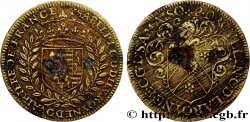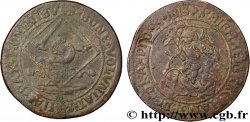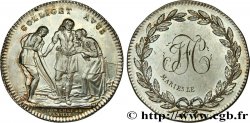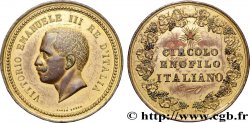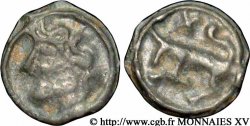fme_971921 - NORMANDY (GENTRY AND TOWNS OF...) Médaille, Fête des bonnes gens, La bonne fille
120.00 €(Approx. 142.80$ | 104.40£)
Quantity
Add to your cart

Type : Médaille, Fête des bonnes gens, La bonne fille
Date: n.d.
Metal : tin
Diameter : 41 mm
Orientation dies : 12 h.
Engraver DUVIVIER Benjamin (1730-1819)
Weight : 24,87 g.
Edge : lisse
Puncheon : sans poinçon
Coments on the condition:
Patine hétérogène. Présence de coups et rayures
Catalogue references :
Obverse
Obverse legend : HIC. PIETATIS - HONOS // À L'EXERGUE : LA. BONNE. FILLE.
Obverse description : La Piété debout à gauche, la tête rayonnante, couronnant une jeune fille et tenant une seconde couronne de roses. Des lis et des épis de blé de part et d’autre. Signé : CA..
Obverse translation : Ceci est l'hommage de la Piété.
Reverse
Reverse legend : PRIX DECERNE PAR LA FRATERNITE. - FONDE EN 1793. // LYCEE / DES / ARTS..
Reverse description : Légende circulaire et en 3 lignes horizontales.
Commentary
Mézidon-Canon (canton du même nom) et Vieux Fumé (canton de Bretteville-sur-Laize) sont situés dans le Calvados. Cette série de jetons de rosières compte 18 numéros selon Feuardent qui s’est appuyé sur un article de M. de La Sicotière, Les rosières en Basse-Normandie. Les couronnes décernées concernent les “bonne fille”, “bonne mère”, “bon vieillard” et “bon chef de famille”. Dans l'esprit de la célébration des vertus, une vingtaine furent élus de 1775 à 1785. Cette fête est instituée en février 1775 par Jean-Baptiste Elie de Beaumont (1732 à Carentan-1786 à Paris), jurisconsulte et avocat, défenseur ardent des protestants et adversaire de l’intolérance religieuse, auteur de mémoires judiciaires (notamment sur l'affaire Calas) qui lui confèrent une réputation européenne et la reconnaissance de Voltaire et de son épouse Anne-Louise Morin-Dumesnil. Jean-Baptiste Elie de Beaumont est par ailleurs franc-maçon et membre de la célèbre loge des Neuf Sœurs et le père de Jean-Baptiste Armand Elie de Beaumont (1798-1874), une des grandes figures scientifiques de la géologie.
Mézidon-Canon (canton of the same name) and Vieux Fumé (canton of Bretteville-sur-Laize) are located in Calvados. This series of rosière tokens has 18 numbers according to Feuardent, who relied on an article by M. de La Sicotière, Les rosières en Basse-Normandie. The crowns awarded concern the “good daughter,” “good mother,” “good old man,” and “good head of family.” In the spirit of celebrating the virtues, around twenty were elected from 1775 to 1785. This festival was established in February 1775 by Jean-Baptiste Elie de Beaumont (1732 in Carentan-1786 in Paris), a legal expert and lawyer, ardent defender of Protestants and opponent of religious intolerance, author of legal briefs (notably on the Calas affair) which gave him a European reputation and the recognition of Voltaire and his wife Anne-Louise Morin-Dumesnil. Jean-Baptiste Elie de Beaumont was also a Freemason and member of the famous lodge of the Nine Sisters and the father of Jean-Baptiste Armand Elie de Beaumont (1798-1874), one of the great scientific figures in geology.
Mézidon-Canon (canton of the same name) and Vieux Fumé (canton of Bretteville-sur-Laize) are located in Calvados. This series of rosière tokens has 18 numbers according to Feuardent, who relied on an article by M. de La Sicotière, Les rosières en Basse-Normandie. The crowns awarded concern the “good daughter,” “good mother,” “good old man,” and “good head of family.” In the spirit of celebrating the virtues, around twenty were elected from 1775 to 1785. This festival was established in February 1775 by Jean-Baptiste Elie de Beaumont (1732 in Carentan-1786 in Paris), a legal expert and lawyer, ardent defender of Protestants and opponent of religious intolerance, author of legal briefs (notably on the Calas affair) which gave him a European reputation and the recognition of Voltaire and his wife Anne-Louise Morin-Dumesnil. Jean-Baptiste Elie de Beaumont was also a Freemason and member of the famous lodge of the Nine Sisters and the father of Jean-Baptiste Armand Elie de Beaumont (1798-1874), one of the great scientific figures in geology.








 Report a mistake
Report a mistake Print the page
Print the page Share my selection
Share my selection Ask a question
Ask a question Consign / sell
Consign / sell
 Full data
Full data
